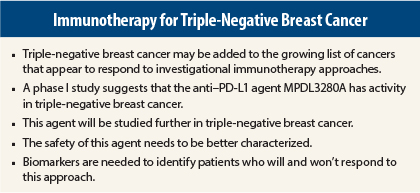An investigational immunotherapy called MPDL3280A showed encouraging and durable clinical activity in heavily pretreated patients with metastatic triple-negative breast cancer, in an early study presented at the 2015 Annual Meeting of the American Association of Cancer Research (AACR).1 Responses were seen in patients who were PD-L1–positive, suggesting that PD-L1 (programmed death ligand 1) may turn out to be a biomarker for response. The durable responses seen in this first-in-human study are not typically seen with chemotherapy in this population.
“This anti–PD-L1 agent has promising clinical activity in triple-negative breast cancer, and these findings support further study in this cancer subtype. The company [Genentech] is preparing to launch a global phase III trial of MPDL3280A in combination with nab-paclitaxel [Abraxane] as first-line therapy for metastatic triple-negative breast cancer,” said lead author Leisha Emens, MD, of Johns Hopkins Sidney Kimmel Cancer Center in Baltimore.
“Immunotherapy is creating a lot of excitement, because many of the responses we see are prolonged. The latest analysis of our data showed a 24-week progression-free survival rate of 27%, with an objective response rate of 19%, and three of four responses are ongoing,” she said.
An Unmet Need
New treatment for metastatic triple-negative breast cancer is an unmet need. Triple-negative breast cancer carries a poor prognosis compared with other types of breast cancer. Chemotherapy is currently the standard approach, and no targeted therapy is currently approved for triple-negative breast cancer in the United States, although bevacizumab (Avastin) is approved for this indication in more than 80 countries worldwide.
An anti–PD-L1 approach is attractive for triple-negative breast cancer, because this type of cancer is highly mutagenic and produces neoantigens that induce an immune response. Triple-negative breast cancer is characterized by an increased number of tumor-infiltrating lymphocytes, which can also facilitate an immune response. Furthermore, triple-negative breast cancer is associated with high levels of PD-L1 expression compared with other types of breast cancer.
MPDL3280A is an engineered anti–PD-L1 antibody that interferes with the binding of PD-L1 to PD-1 and B7, which is thought to restore antitumor T-cell activity and enhance T-cell priming.
Study Findings
The phase I trial Dr. Emens reported at the AACR meeting included a variety of cancer types, analysis included 54 patients total, with any level of PD-L1 expression. All 54 patients were evaluable for safety, and 69% of these patients had PD-L1–positive (IHC 2/3) disease by the proprietary assay. Twenty-one of the 54 patients were evaluable for efficacy, all of whom were PD-L1–positive (IHC 2/3).
MPDL3280A was generally well tolerated. The most common treatment-related adverse events included fatigue, nausea, fever, decreased appetite, and asthenia. Eleven percent of patients had grade 3 treatment-related adverse events. Two deaths occurred, and the causes are currently being —investigated.
The overall response rate was 19%, and 24-week progression-free survival was 27%. There were two complete responses and two partial responses; three of four responses are ongoing. The median duration of response has not yet been reached (range, 18–56 weeks). The median duration of survival follow-up is 40 weeks (range, 2+ to 85+ weeks).
Of the 21 PD-L1–positive patients, 3 experienced pseudoprogression, and all 3 eventually had tumor shrinkage. Dr. Emens explained that pseudoprogression occurs with anti–PD-L1 treatment, a phenomenon that other investigators have reported. This means that in patients with observable tumor shrinkage of target lesions who are doing well clinically on an anti–PD-L1 agent, new lesions can emerge after treatment, but they eventually respond.
“The phenomenon of pseudoprogression is new for clinicians to manage. If there is evidence of new lesions on a scan and a patient is doing well clinically, continue to treat [with anti–PD-L1] and re-evaluate. We need to work with physicians, patients, and payers to educate them about how to manage this,” she noted.
“This is another powerful indication of immune checkpoint inhibitor strategies for diseases for which we don’t have many effective therapies,” said Louis M. Weiner, MD, who moderated a press conference at the AACR meeting where these data were discussed. “Triple-negative breast cancer has a worse prognosis than other subtypes and is a disease that gives cancer a bad name.” Dr. Weiner is Director of the Lombardi Comprehensive Cancer Center at Georgetown University Medical Center in Washington, DC.
“The implications for triple-negative breast cancer are exciting,” Dr. Weiner stated. ■
Disclosure: Dr. Emens reported no potential conflicts of interest. Dr. Weiner is an advisor to Jounce Therapeutics and Celldex Therapeutics.
Reference
1. Emens LA, Braiteh FS, Cassier P, et al: Inhibition of PD-L1 by MPDL3280A leads to clinical activity in patients with metastatic triple-negative breast cancer. 2015 AACR Annual Meeting. Abstract 2859. Presented April 20, 2015.




